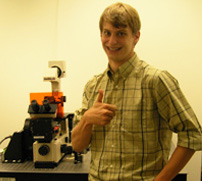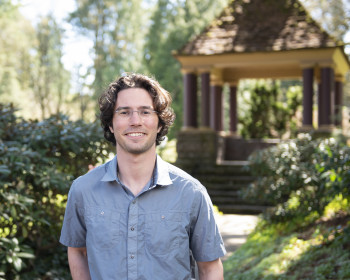Summer science research: Students study neuron bonds that support memory
Open gallery

At Lewis & Clark, the lazy days of summer are anything but. Devoting 40 hours a week to rigorous scientific research, an elite group of students perform collaborative research with faculty each summer.
This summer, three Rogers Summer Science Research participants are working alongside Pamplin Professor of Science Janis Lochner and Professor of Physics Bethe Scalettar to study memory. Lochner and Scalettar have won accolades for their research into the formation of long-term memory and have previously published the results of their collaborative research with students.
“We’re studying memory and the process by which neurons interact with one another to form stronger bonds,” said Alex Simon, a junior biochemistry and molecular biology major. “Frequently, in the lab, my mind is blown. We’re learning about learning—that’s wild.”
Learn more about the research that Simon and his peers Lindsay Hilken, a senior music and biochemistry and molecular biology double major, and Louis Prahl, a senior physics major, are doing this summer in this podcast (mp3).
About the program
The John S. Rogers Science Research Program allows students to participate in graduate-level research with an emphasis on strengthening their communication skills by requiring presentations of their findings. This summer, 40 students are pursuing topics that range from nanoparticles to neuromodulators, and binary stars to drinking behaviors. Working closely with peers and faculty members, students undertake research questions and present their work in two public venues.
“We’re not asking you anymore, ‘What’s the answer,’ we’re saying ‘What’s the question,” said Michael Broide, director of the Rogers Program and chair of the physics department. “I think what sets our program apart is that regardless of what project you are on, we’re all going to come together as a group to present what we’re doing in as accessible a way as possible. In science, it’s such an important skill to be able to explain cogently what you’re doing.”
In this podcast (mp3), learn more about the history of the program and hear what it offers students, faculty, and the community at large.
Students make their final research presentation at the Rogers Summer Science Poster session. Scheduled for September 16, the poster session is free and open to the public.
*Senior Emily Stevens produced these podcasts.
More Newsroom Stories
Public Relations is located in McAfee on the Undergraduate Campus.
MSC: 19
email public@lclark.edu
voice 503-768-7970
Public Relations
Lewis & Clark
615 S. Palatine Hill Road MSC 19
Portland OR 97219

